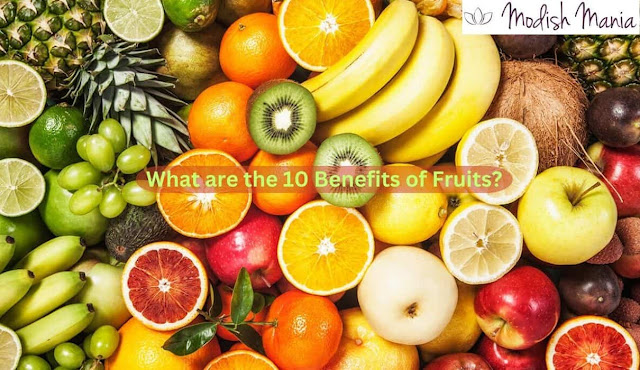 |
| What are the 10 Benefits of Fruits? |
Introduction
Fruits are not only delicious but also packed with essential nutrients that contribute to overall health and well-being. Incorporating a variety of fruits into your diet can offer numerous benefits for your body and mind. In this article, we will explore the top 10 benefits of fruits and why they should be an integral part of your daily eating habits.
Benefit 1: Nutritional Value
Fruits are a rich source of vitamins, minerals, and dietary fiber. They provide a wide range of essential nutrients necessary for the optimal functioning of the body. Fruits like oranges, berries, and kiwis are high in vitamin C, which supports the immune system and promotes healthy skin.
Benefit 2: Antioxidant Properties
Many fruits are packed with antioxidants that help fight against free radicals in the body. These antioxidants protect cells from damage and reduce the risk of chronic diseases such as cancer, heart disease, and inflammation. Blueberries, pomegranates, and grapes are excellent sources of antioxidants.
Benefit 3: Weight Management
Incorporating fruits into a balanced diet can aid in weight management. Fruits are low in calories and high in fiber, making them a satisfying snack option. They provide natural sugars and essential nutrients without the excessive calories found in processed snacks. Filling up on fruits can help curb cravings and prevent overeating.
Benefit 4: Digestive Health
Many fruits contain high levels of dietary fiber, which aids in digestion and promotes bowel regularity. Fiber helps prevent constipation and maintains a healthy digestive system. Fruits such as apples, bananas, and papayas are particularly beneficial for promoting good digestive health.
Benefit 5: Heart Health
Regular consumption of fruits is associated with a reduced risk of heart disease. Fruits are naturally low in sodium and high in potassium, which helps regulate blood pressure levels. Additionally, fruits like berries and citrus fruits are rich in antioxidants and flavonoids, which can lower the risk of heart disease and improve overall cardiovascular health.
Benefit 6: Skin Health
The nutrients and antioxidants found in fruits can have a positive impact on the health and appearance of your skin. Fruits rich in vitamin C, such as oranges and strawberries, promote collagen production, which keeps the skin firm and reduces the signs of aging. Additionally, fruits with high water content, like watermelon and cucumbers, can hydrate the skin and give it a healthy glow.
Benefit 7: Hydration
Many fruits have high water content, making them an excellent choice for staying hydrated. Proper hydration is essential for maintaining optimal bodily functions, supporting healthy metabolism, and regulating body temperature. Fruits like watermelon, grapes, and oranges can help replenish fluids and electrolytes in the body.
Benefit 8: Boosted Immunity
Fruits play a crucial role in supporting a strong immune system. They are rich in vitamins A, C, and E, which enhance the production of white blood cells and strengthen the body's defense against infections and diseases. Citrus fruits, kiwis, and papayas are known for their immune-boosting properties.
Benefit 9: Reduced Risk of Chronic Diseases
A diet rich in fruits has been linked to a lower risk of chronic diseases, including certain types of cancer, diabetes, and obesity. The diverse range of nutrients, antioxidants, and fiber found in fruits contributes to improved overall health and helps protect against the development of various chronic conditions.
Benefit 10: Increased Energy Levels
Fruits are a natural source of energy due to their carbohydrate content, which provides a quick and easily digestible source of fuel for the body. Snacking on fruits can give you a natural energy boost and keep you feeling revitalized throughout the day.
Conclusion
Incorporating a variety of fruits into your daily diet can provide numerous benefits for your health and well-being. From their nutritional value and antioxidant properties to their positive impact on weight management, heart health, and skin health, fruits are nature's gift to our bodies. Make it a habit to enjoy different fruits every day and reap the rewards of a healthier lifestyle.
FAQs
1. Can I get the same benefits from consuming fruit juices instead of whole fruits?
While fruit juices can provide some of the nutrients found in whole fruits, they lack the dietary fiber that plays a crucial role in digestion and overall health. It's always best to consume whole fruits to maximize the benefits.
2. How many servings of fruits should I aim for each day?
The recommended daily intake of fruits varies depending on factors such as age, sex, and activity level. As a general guideline, aim for at least 2-3 servings of fruits per day to meet your nutritional needs.
3. Are frozen fruits as nutritious as fresh fruits?
Frozen fruits can retain a significant portion of their nutritional value if frozen at their peak ripeness. They can be a convenient and cost-effective alternative when fresh fruits are not readily available.
4. Can fruits help with weight loss?
Fruits can be a valuable addition to a weight loss plan due to their low calorie and high fiber content. However, it's important to maintain a balanced diet and consider portion sizes to achieve sustainable weight loss.
5. Are there any fruits that are not recommended for certain medical conditions or allergies?
Yes, some fruits may interact with certain medications or trigger allergies in susceptible individuals. If you have specific medical conditions or allergies, it's best to consult with a healthcare professional to determine which fruits are suitable for you.
